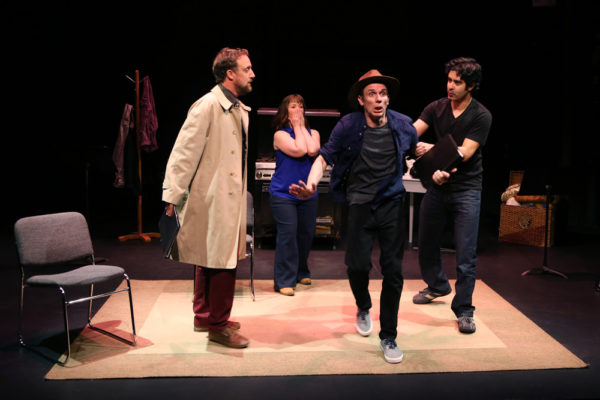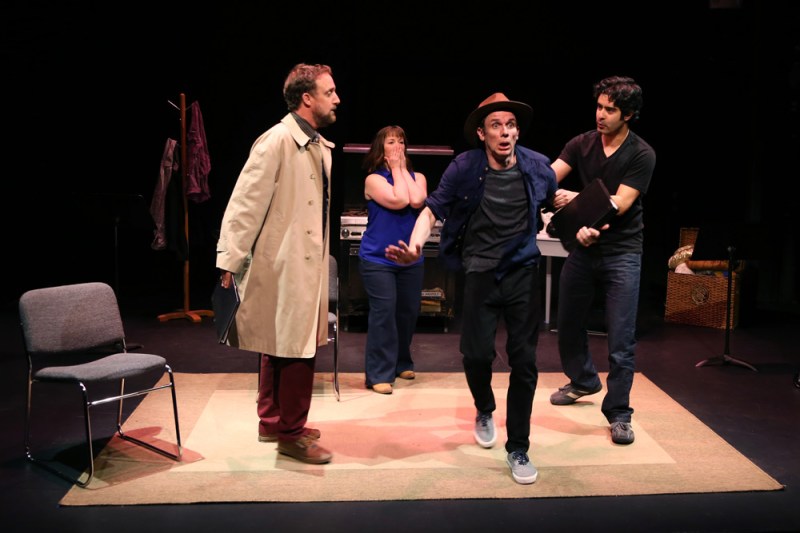
The world premiere of Saïd Sayrafiezadeh’s ‘Autobiography of a Terrorist,’ produced by Golden Thread Productions, just closed in San Francisco, and I’m still thinking about it. ‘Autobiography’ is one amongst many new, meta and self-referential plays that seek to peer introspectively into how theater shapes audiences and can act as a form of activism and tool for social awareness. Through a series of complex onstage interactions and clever manipulation of what the audience believes is real, Sayrafiezadeh crafts ‘Autobiography’ into an emotional, meaningful work with a twist that, even as someone familiar with this pop fake play-within-a-play format, still leads me to consider the issues at hand.
Upon entering the theater, a nervous stagehand rushed to hand me a piece of program, printed upon a flimsy 8.5 x 11 sheet of paper. “Autobiography of a Terrorist: A Collection of Scenes,” it read. I frowned. A collection of scenes? I thought nothing of it. As the lights dimmed, a man introduced himself as Sayrafiezadeh, a playwright and actor, and told the audience about his collection of scenes, which was, as his director thought, not quite a finished play. As the piece progressed, scenes of Sayrafiezadeh’s experience as an Iranian/Jewish-American in the US were interwoven with brief commentary — he told of his changed experiences pre- and post-9/11, in which public perception of him shifted so drastically from one of happiness, seen as a white American, to one of fear and hatred, seen later as an outsider and Middle Easterner.
Many of the scenes were quite humorous in nature, playing up the utterly ridiculous behavior of many Caucasian individuals as directed towards Sayrafiezadeh. Yet things took a sharp turn towards the dramatic as a scene in which a fictionalized version of Sayrafiezadeh was being hidden in a stove by his hypothetical white wife, and the wife screams, “Fuck America!” Suddenly, a man burst in, introducing himself as the director, and demands that the scene be censored and changed for the sake of the production. It was only at that moment that I realized the “collection of scenes” was in fact a staged premise to set the audience up for the true play, which was the interaction between the director, Sayrafiezadeh, and the two other actors. I have to applaud ‘Autobiography’ for keeping me fooled that long.
What proceeded was a poignant, intense exploration of the perception of truth and censorship. The “director,” who had characteristics similar to that of many right-wing individuals today, debated with Sayrafiezadeh over how best to proceed with that scene. New questions were brought up — who gets to tell the truth behind history? Who has jurisdiction over fictionalizing true stories? Who has the right to censor opinion? As actors traded roles onstage and the “director” refused to let Sayrafiezadeh be involved with the “production,” an interesting power play began to form. The white “director” had authority over Sayrafiezadeh and the play, even going as far as turning the lights off in the theater, but Sayrafiezadeh could still shout in the dark. The “director” also got hold of Sayrafiezadeh’s personal journal, filled with musings of meetings with other white Americans — many of whom were filled with hatred, disgust and loathing. Nevertheless, Sayrafiezadeh could still tell of the exploits and reality behind sketchy government dealings in the Middle East, arguing for the truth to be revealed.
As the play became more and more divisive, its internal workings shuttled in between commentary and comedy. As the “director” demanded that the actors switch roles for the sake of censoring Sayrafiezadeh, Sayrafiezadeh’s name was announced — and mispronounced — again and again by the initial nervous-looking stagehand, who I realized was actually an actor in the play, even reaching the point of being called “Saïd Sa-Fried Rice.” But it was only about halfway through the mispronunciations that most of the audience began to see how ridiculous it was. “Sayrafiezadeh,” pronounced “seh-uh-ruh-fee-ZAH-day,” was honestly not that difficult, and he certainly made that point clear. Instead of being unnecessarily petty and xenophobic, just learn to pronounce it — a couple times under the tongue and you’re all set.
The biggest surprise actually came at the end of the play after I was out of the theater. As ‘Autobiography’ ended on a tense, rightfully uncomfortable note, audience members were handed a real program, printed beautifully in a classic playbill format. Scanning through it on the Caltrain ride back, I realized that Sayrafiezadeh was not actually Sayrafiezadeh all along — he was played by an actor, Damien Seperi. This revelation was somehow even more shocking than some of the elements of the play itself, because I realized that I could be fooled into an entirely new reality in the blink of an eye. At that moment, ’Autobiography’ made me question what I might not be seeing around me or what I might not be critically questioning that may be vitally hurting my view upon the world. I still don’t know whether ‘Autobiography’ was semi-autobiographical, or how much of the piece was invented, adapted or actually real. Somehow, that feeling of confusion and uncertainty seems to define American politics and society today, fueled by misconceptions of people around us. ‘Autobiography’ seeks to show people the dire need to break these notions for the sake of our sanity and the sake of the future of our nation.
Contact Olivia Popp at opopp ‘at’ stanford.edu.
